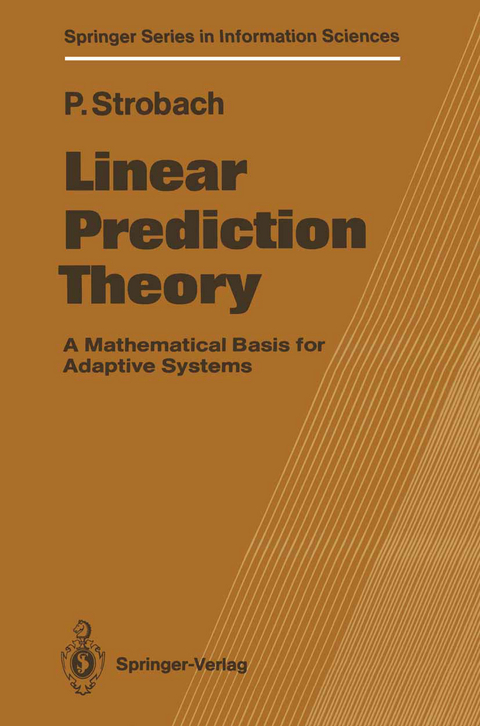
Linear Prediction Theory
Springer Berlin (Verlag)
978-3-642-75208-7 (ISBN)
1. Introduction.- 2. The Linear Prediction Model.- 2.1 The Normal Equations of Linear Prediction.- 2.2 Geometrical Interpretation of the Normal Equations.- 2.3 Statistical Interpretation of the Normal Equations.- 2.4 The Problem of Signal Observation.- 2.5 Recursion Laws of the Normal Equations.- 2.6 Stationarity - A Special Case of Linear Prediction.- 2.7 Covariance Method and Autocorrelation Method.- 2.8 Recursive Windowing Algorithms.- 2.9 Backward Linear Prediction.- 2.10 Chapter Summary.- 3. Classical Algorithms for Symmetric Linear Systems.- 3.1 The Cholesky Decomposition.- 3.2 The QR Decomposition.- 3.3 Some More Principles for Matrix Computations.- 3.4 Chapter Summary.- 4. Recursive Least-Squares Using the QR Decomposition.- 4.1 Formulation of the Growing-Window Recursive Least-Squares Problem.- 4.2 Recursive Least Squares Based on the Givens Reduction.- 4.3 Systolic Array Implementation.- 4.4 Iterative Vector Rotations - The CORDIC Algorithm.- 4.5 Recursive QR Decomposition Using a Second-Order Window.- 4.6 Alternative Formulations of the QRLS Problem.- 4.7 Implicit Error Computation.- 4.8 Chapter Summary.- 5. Recursive Least-Squares Transversal Algorithms.- 5.1 The Recursive Least-Squares Algorithm.- 5.2 Potter's Square-Root Normalized RLS Algorithm.- 5.3 Update Properties of the RLS Algorithm.- 5.4 Kubin's Selective Memory RLS Algorithms.- 5.5 Fast RLS Transversal Algorithms.- 5.6 Descent Transversal Algorithms.- 5.7 Chapter Summary.- 6. The Ladder Form.- 6.1 The Recursion Formula for Orthogonal Projections.- 6.2 Computing Time-Varying Transversal Predictor Parameters from the Ladder Reflection Coefficients.- 6.3 Stationary Case - The PARCOR Ladder Form.- 6.4 Relationships Between PARCOR Ladder Form and Transversal Predictor.- 6.5 The Feed-BackPARCOR Ladder Form.- 6.6 Frequency Domain Description of PARCOR Ladder Forms.- 6.7 Stability of the Feed-Back PARCOR Ladder Form.- 6.8 Burg's Harmonic Mean PARCOR Ladder Algorithm.- 6.9 Determination of Model Order.- 6.10 Chapter Summary.- 7. Levinson-Type Ladder Algorithms.- 7.1 The Levinson-Durbin Algorithm.- 7.2 Computing the Autocorrelation Coefficients from the PARCOR Ladder Reflection Coefficients - The "Inverse" Levinson-Durbin Algorithm.- 7.3 Some More Properties of Toeplitz Systems and the Levinson-Durbin Algorithm.- 7.4 Split Levinson Algorithms.- 7.5 A Levinson-Type Least-Squares Ladder Estimation Algorithm.- 7.6 The Makhoul Covariance Ladder Algorithm.- 7.7 Chapter Summary.- 8 Covariance Ladder Algorithms.- 8.1 The LeRoux-Gueguen Algorithm.- 8.2 The Cumani Covariance Ladder Algorithm.- 8.3 Recursive Covariance Ladder Algorithms.- 8.4 Split Schur Algorithms.- 8.5 Chapter Summary.- 9. Fast Recursive Least-Squares Ladder Algorithms.- 9.1 The Exact Time-Update Theorem of Projection Operators.- 9.2 The Algorithm of Lee and Morf.- 9.3 Other Forms of Lee's Algorithm.- 9.4 Gradient Adaptive Ladder Algorithms.- 9.5 Lee's Normalized RLS Ladder Algorithm.- 9.6 Chapter Summary.- 10. Special Signal Models and Extensions.- 10.1 Joint Process Estimation.- 10.2 ARMA System Identification.- 10.3 Identification of Vector Autoregressive Processes.- 10.4 Parametric Spectral Estimation.- 10.5 Relationships Between Parameter Estimation and Kalman Filter Theory.- 10.6 Chapter Summary.- 11. Concluding Remarks and Applications.- A.1 Summary of the Most Important Forward/Backward Linear Prediction Relationships.- A.2 New PORLA Algorithms and Their Systolic Array Implementation.- A.3 Vector Case of New PORLA Algorithms.
| Erscheint lt. Verlag | 27.12.2011 |
|---|---|
| Reihe/Serie | Springer Series in Information Sciences |
| Zusatzinfo | XVI, 422 p. |
| Verlagsort | Berlin |
| Sprache | englisch |
| Maße | 155 x 235 mm |
| Gewicht | 667 g |
| Themenwelt | Naturwissenschaften ► Physik / Astronomie ► Allgemeines / Lexika |
| Naturwissenschaften ► Physik / Astronomie ► Theoretische Physik | |
| Schlagworte | algorithm • algorithms • combinatorics • Communication • Computer Science • control systems • Geophysics • Signal • Signal Processing • System • System Identification |
| ISBN-10 | 3-642-75208-X / 364275208X |
| ISBN-13 | 978-3-642-75208-7 / 9783642752087 |
| Zustand | Neuware |
| Haben Sie eine Frage zum Produkt? |
aus dem Bereich


